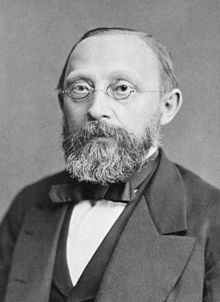Rudolf Virchow
| Rudolf Virchow | |
|---|---|
 |
|
| Born |
13 October 1821 Schivelbein, Pomerania, Kingdom of Prussia |
| Died | 5 September 1902 (aged 80) Berlin, German Empire |
| Resting place |
Alter St.-Matthäus-Kirchhof, Schöneberg 52°17′N 13°13′E / 52.28°N 13.22°E |
| Nationality | Prussian |
| Fields |
Medicine Anthropology |
| Institutions |
Charité University of Würzburg |
| Alma mater | University of Berlin |
| Thesis | de rheumate praesertim corneae (184) |
| Doctoral advisor | Johannes Peter Müller |
| Other academic advisors | Robert Froriep |
| Notable students |
Ernst Haeckel Edwin Klebs Franz Boas Adolph Kussmaul Friedrich Daniel von Recklinghausen Max Westenhöfer |
| Known for |
Cell theory Cellular pathology Biogenesis Virchow's triad |
| Influenced |
Eduard Hitzig Charles Scott Sherrington Paul Farmer |
| Notable awards | Copley Medal (1892) |
| Spouse | Ferdinande Rosalie Mayer (aka Rose Virchow) |
| Signature | |
Rudolf Ludwig Carl Virchow (English /ˈvɪərkoʊ, ˈfɪərxoʊ/;German: [ˈvɪɐ̯çoː]; 13 October 1821 – 5 September 1902) was a German physician, anthropologist, pathologist, prehistorian, biologist, writer, editor, and politician, known for his advancement of public health. He is known as "the father of modern pathology" because his work helped to discredit humourism, bringing more science to medicine. He is also known as the founder of social medicine and veterinary pathology, and to his colleagues, the "Pope of medicine".
Born and raised in Schievelbein (Świdwin) as an only child of a working-class family, he proved to be a brilliant student. Dissuaded by his weak voice, he abandoned his initial interest in theology and turned to medicine. With special military scholarship, he earned his medical degree from Friedrich-Wilhelms Institute (Humboldt University of Berlin) under the tutelage of Johannes Peter Müller. He worked at the Charité hospital under Robert Froriep, whom he eventually succeeded as the prosector.
...
Wikipedia
